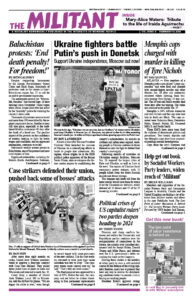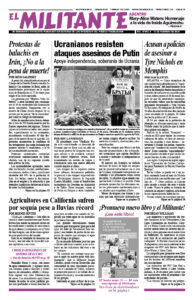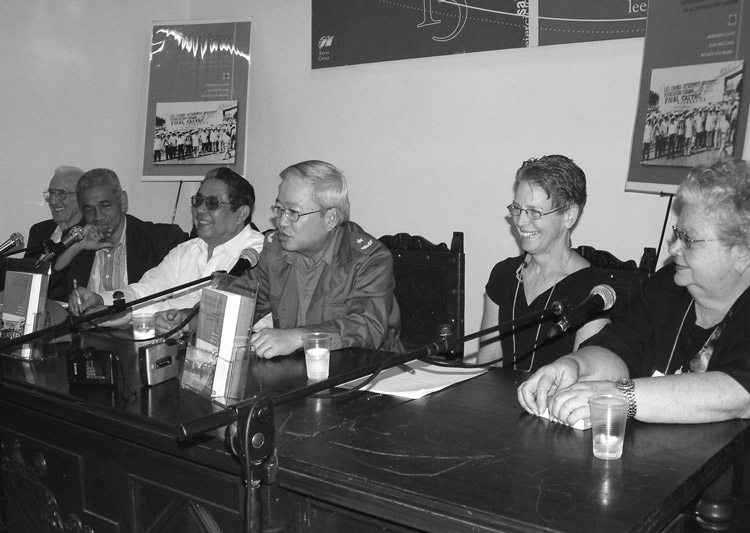Iraida Aguirrechu was one of the hundreds of thousands of Cuban women and men whose entire life trajectory was shaped — and made possible — by Cuba’s socialist revolution. A revolution that has defied more than six decades of attempts by the strongest imperialist power in history to destroy it.
She died in Havana on Dec. 27, 2022, age 87, after several years of declining health, accelerated by the social isolation of the COVID pandemic. Her ashes were placed in the honored space of Havana’s historic Colón Cemetery reserved for men and women whose lives of revolutionary activity earned them that recognition. (See my accompanying remarks.)
Iraida was not one of the leaders of the Cuban Revolution whose names are known throughout the world. Without women and men like her, however, that revolution would not have triumphed, and never would have endured.
She was born in 1936 into a comfortably well-off landowning family in what is now the Cuban province of Artemisa. Her parents were Basque emigrants, and she often remarked she had a “strict” upbringing, as well as the benefits of a good education. She earned a bachelor’s degree in teaching and a doctorate in pedagogy, philosophy and mathematics.
As a student and then volunteer teacher, she joined the revolutionary underground in Havana, working to supply food and medicine for the Rebel Army in the mountains. On one occasion she was arrested by the police, fingered by an informer.
After the victorious overthrow of the Batista dictatorship on Jan. 1, 1959, Iraida proudly turned over the land inherited from her father to INRA, the National Institute of Agrarian Reform.
She enlisted in the newly formed revolutionary militias and then joined the ranks of the FAR, the Revolutionary Armed Forces. She served in many different educational and administrative capacities under Camilo Cienfuegos, Armando Hart, José Ramón Fernández and other central leaders of the revolution. By the time she resigned her commission in the FAR in 1973 to take on an internationalist mission, she held the rank of first lieutenant.
Soon after the triumph of the revolutionary war, Iraida married Hermes Caballero Carreras, a cadre of the July 26 Movement underground from Santiago de Cuba. The underground there was led by Frank País and, after País was assassinated by the dictatorship, by Vilma Espín. Hermes was a veteran of the Nov. 30, 1956, uprising in Santiago, which had been planned to coincide with the landing of the Granma, the boat carrying 83 combatants of the Rebel Army, including Fidel Castro and Che Guevara, to launch the armed struggle in the Sierra Maestra mountains of eastern Cuba.
Together Hermes and Iraida raised three children, as they also carried out two internationalist assignments. The first, beginning in 1973, was as part of the Cuban diplomatic mission in Equatorial Guinea. The second, from 1976-79, was in Mexico, where Iraida served as the consul general of Cuba’s embassy.
From the mid-1980s until she was well into her eighth decade, Iraida was the senior editor at Editora Política, the publishing house of the Central Committee of the Cuban Communist Party. She was responsible for the editing and publication of speeches and writings of Fidel and Che, as well as the texts and documents of the congresses of the party, the Union of Young Communists (UJC) and others.
As if that were not enough, she also volunteered her time and editorial abilities to take on work for Editorial Capitán San Luis, the publishing house of the Ministry of the Interior.
It was during her years at Editora Política that leaders of the Socialist Workers Party came to know and work with Iraida, beginning with the publication of Che Guevara’s Bolivian Diary in 1994. By then the book had been long out of print in English. In the course of that editorial work, in order to clarify details and ambiguities in Che’s account, Iraida introduced us to Cuban Brig. Gen. Harry Villegas (Pombo). After Che fell in combat in October 1967, it was Pombo who led the small band of Cuban and Bolivian combatants who eluded the encirclement jointly organized by the Bolivian army and U.S. intelligence, eventually returning to Cuba some five months later.
That was the beginning of several decades of fruitful work by Pathfinder Press, in collaboration with Editora Política, the Association of Combatants of the Cuban Revolution, and numerous Cuban leaders known there as the “históricos.” They became our comrades as well, educating us with countless insights into the past and present of the Cuban Revolution, as we occasionally relaxed for an hour or two on Pombo’s or Iraida’s veranda over a platter of mangos and a bottle of rum.
Iraida was prodigiously productive, named to the national roster of Vanguard Workers 17 years in a row. She was never happy without work to do. Editing late into the night and then rising well before 5 a.m. to meet some pressing deadline. That was her norm. She got great satisfaction out of helping to train new young editors, especially young women. She was never the easiest person to work with, however, as she held others to the same high standards she demanded of herself. To those she respected, she was generous and kind.
The books we produced were her books as well. Without Iraida none of this would have been possible.


